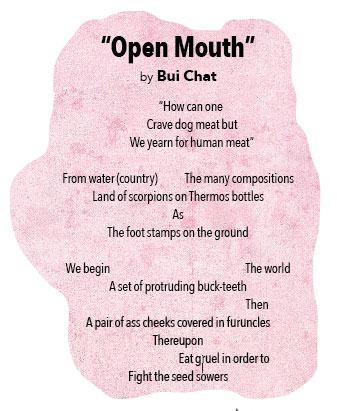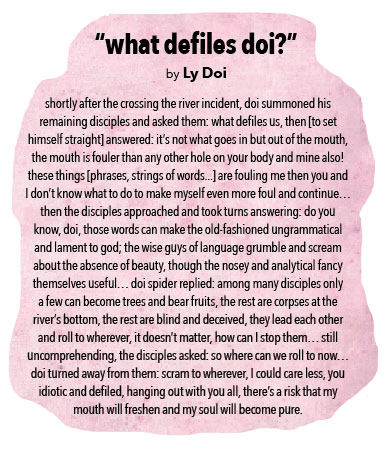The twelfth part of a Southeast Asia Globe series that shines a light on the region’s finest poetry
Compiled by Nathan A. Thompson Illustration by Natalie Philips
Bui Chat and Ly Doi are the most disruptive poets working in Southeast Asia today. Based in Ho Chi Minh City, they founded the Open Mouth poetry group. The group’s name functions as a command to be outspoken – something members take very seriously, as they publish without the approval of government censors. This means their work is hard to find in Vietnam but is more accessible online. They have found many admirers among the diaspora and, as their work has been translated, the wider poetry world. Indeed, Bui Chat won the IPA Freedom to Publish Prize in 2011.
In “Open Mouth”, Bui Chat draws on the Western avant garde tradition, creating a cut-up of images. The grotesque is invoked from the first reference to cannibalism right through to the “ass cheeks covered in furuncles”. Vandalised lines are thrown about the page as if torn apart by anger. This destruction of form in favour of a crass hodgepodge feels like an authentic attempt to represent the chaos and violence of urban life. The poem fights any attempt to make rational sense of its lines,
instead laying open a mass of malformed subconscious sludge – a move that questions authoritarian ideas of how a poem and, by inference, society ought to function.
Vietnamese society is further satirised by Ly Doi’s “what defiles doi?” The piece is extracted from a series of prose poems called Seven Spider Improvisations and satirises the Confucian discourses by juxtaposing the classic form with vernacular, ungrammatical language. In a manner that recalls Nietzsche’s Thus Spoke Zarathustra, the master upends traditional values, seeking instead to “make myself even more foul”. Ly Doi’s lament at his “uncomprehending” disciples turns his acerbic eye on contemporary Vietnamese society, which is caught in a tussle between capitalism and communism, leaving lost people to “roll to wherever”.




